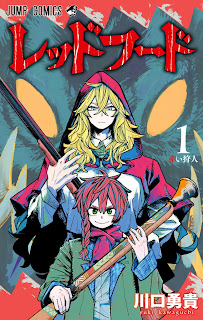Two weeks ago, Viz Media made a variety of new manga release announcements on Twitter, both for physical & digital-only. One that was interesting in both the announcement itself & the reaction to it was that The Hunters Guild: Red Hood by Yuki Kawaguchi would be receiving a physical release starting in the Fall. What makes this announcement interesting is the fact that Red Hood only ran for a scant 18 chapters in Weekly Shonen Jump throughout late 2021 (not including the original one-shot), and will only total three volumes in length. However, while Red Hood seemingly failed to find an audience in its own home country of Japan, it looked to have found a bit of a rabid cult following with English-speaking readers, due to its initial simulpublishing. Viz looks to feel that Red Hood's fandom was enough to give the manga a physical release in North America, despite it getting canned quickly in Japan.
However, if you look at the responses to that announcement tweet, you'll also see a decent amount of people questioning the decision to give Red Hood this treatment. Aside from those who simply would have preferred other titles instead, a common complaint basically boils down to this thought: "But It Was Cancelled! Why Would Anyone Want to Buy a Cancelled Manga?".
(Also, please don't go sassing companies about the stuff they choose to release to the point of the publisher actually calling you out on such behavior. That's just messed up.)
Every single manga magazine has its own history of cancelled series, but there might not be one as notoriously cutthroat as Weekly Shonen Jump. On the one hand, one can argue that Shueisha's infamously strict cut-off point does result in (for the most part) only the strongest overall manga being allowed to survive or even thrive in Jump, which in turn helps create a long history of extremely strong and/or memorable titles. On the other hand, almost anyone who's followed Jump manga for any length of time can name at least a couple of series that they feel were unfairly cut short way too early & weren't allowed to truly live up to their potential, and there have been very few that were allowed second chances in some way (Rising Impact, Hareluya [II BØY], iShojo[+], Otoko Zaka [which took ~30 years to happen!], etc.). However, I'd argue that there is still merit in reading these kinds of short-run manga, & in turn there's value in manga publishers licensing these series for release outside of Japan.
In particular, I'd like to focus mostly on short-lived manga by successful mangaka, whether they came before their respective hit series, or if they were what had to follow-up what they're most iconic for, and since this piece was inspired by a Jump manga, let's focus on that magazine for now. We'll be splitting this up across five decades, so let's start at the most logical spot: The Beginning.


